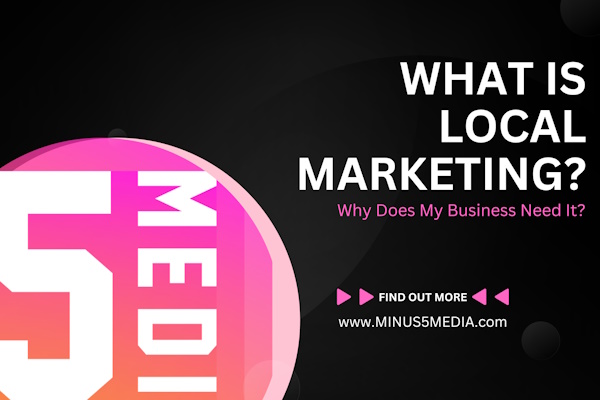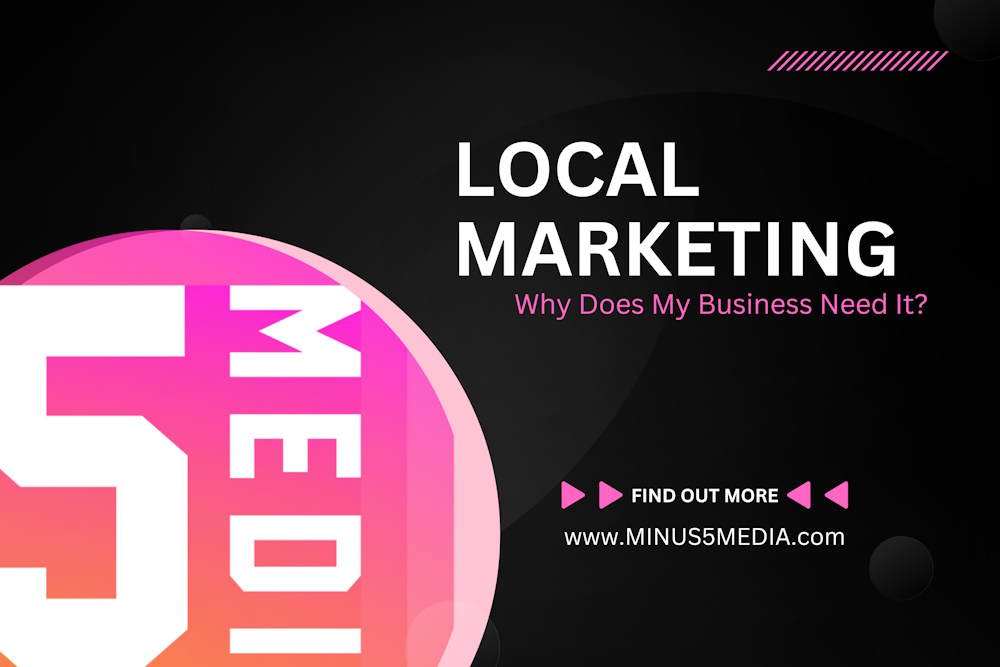Local Marketing: Why Does My Business Need It? – As technology becomes ever more integral to our lives, it’s easy to overlook the power of local marketing or as it’s also known, Local SEO. But for small and large businesses, a strong local marketing strategy can provide a competitive edge that may make the difference between success and stagnation.
Defining Local Marketing
Local marketing, also known as location-based digital marketing or local area marketing, is a strategy that businesses use to engage consumers at a community level. It leverages local familiarity and vicinity to build a deeper, more personal connection with the customer base. This might involve participating in local events, targeting advertisements in specific areas, or optimising online content for local search results.
The Power of Localisation
Globalisation and digital marketing have removed many geographic barriers in business, opening new opportunities. But this doesn’t mean you should ignore your local market. Local marketing is about recognising and seizing opportunities right in your backyard. It focuses on understanding and meeting the needs of customers in your immediate geographic area, building on the simple but powerful idea that people like to support businesses in their community.
1. Building Trust and Loyalty
Local businesses are often considered the backbone of the community. They offer an unparalleled level of personal interaction, allowing them to build meaningful relationships with their customers. Consumers tend to trust local businesses more, seeing them as more accountable than faceless, distant corporations. Local marketing fosters this trust, enhancing customer loyalty and encouraging repeat business.
2. Cost-Effective Advertising
While the prospect of reaching a global audience can be tempting, it often comes with a significant cost. With local marketing, you can focus your resources on a smaller, more targeted audience. This allows for more personalised, effective, and therefore cost-effective advertising.
3. Increased Visibility in Local Search Results
People often look for businesses ‘near me’ or in their local area when searching online. Optimising your online content for local search results is a powerful way to reach potential customers. If you run a bakery in Seattle, for example, you’ll want to show up in the results when someone searches for “digital agency Malaga.” Local search engine optimisation (SEO) makes this possible.
4. Local Partnerships and Collaboration
Local marketing opens up opportunities for partnerships and collaboration with other local businesses. Whether it’s co-sponsoring a community event or creating joint promotional offers, these partnerships can significantly extend your reach and visibility in the local market.
5. Responding to Local Needs and Trends
Understanding your local market allows you to respond more effectively to local needs and trends. If a popular sports team in your area wins a championship, for example, a local business could offer related promotions or products. This kind of localised response is often impractical for larger, less locally focused businesses.
While expanding your business reach nationally or even globally is certainly appealing, it’s important to never overlook the community in which you are based. Local marketing can be a powerful tool for businesses of all sizes, providing an avenue for meaningful connections, a targeted and cost-effective advertising strategy, improved local visibility online, opportunities for community partnerships, and the ability to respond effectively to local trends and needs. A successful local marketing strategy can turn your neighbours into your most loyal customers.
The most common questions asked by potential customers about Local Marketing:
What is Local Marketing?

Local Marketing refers to the strategies and techniques businesses use to promote their products or services to customers in their immediate geographic area. This form of marketing is not about casting the widest net, but rather about focusing on the people who are most likely to engage and convert: the local community. It capitalises on people’s pride in their community and their desire to support local businesses.
By using local marketing strategies, businesses can build strong relationships with local customers, increase brand awareness, and drive more foot traffic or local online sales. Effective local marketing techniques range from traditional methods like sponsoring local events or placing ads in local newspapers, to digital strategies like local SEO, local Google business pages, and Google Maps optimisation.
What is Local SEO and why is it important for my business?
Local SEO (Search Engine Optimisation) is the process of optimising a business’s online presence to attract more business from relevant local searches on search engines like Google. It’s crucial because people frequently use search engines to find local information. For instance, they might search for “Website design company” or “Web design company in Malaga“.
By optimising using local SEO techniques, businesses improve their visibility for these types of searches, making it easier for potential local customers to discover them. Increased visibility in search engine results can lead to increased website traffic, calls, and physical visits to your store or office, ultimately leading to more sales and growth for your business.
How does Google Maps play a role in Local Marketing?

Google Maps is a critical component of local marketing because it helps potential customers find and reach businesses. When users search for a business or a type of business in a particular area, Google Maps provides them with a list of relevant businesses in that location, along with their contact information, reviews, and directions.
Not only does Google Maps make it easy for customers to find your business location, but a well-optimised Google Maps listing can also improve your ranking in local search results. When your business appears high in the search results, it can increase your visibility, credibility, and the likelihood that potential customers will choose your business over your competitors.
What are Local Google Business pages and how do they help my business?
Local Google Business Pages, now known as Google Business (GB) listings, are free and powerful tools that allow businesses to manage their online presence across Google, including Search and Maps. By verifying and optimising your GB listing, you can help potential customers find you, tell them your story, and attract more local businesses.
A Google Business listing provides valuable information about your business, such as your address, business hours, and customer reviews, directly in the search results. It can also show photos of your business, which can make it more appealing to potential customers. This visibility and accessibility can boost your local marketing efforts by increasing brand awareness and driving more foot traffic or local online sales.
How can I optimise my business for Local SEO?
Optimising your business for local SEO services involves various steps. Firstly, create a Google My Business page, ensuring that all your information is accurate and up to date. Regularly update your page with new photos, and posts, and respond to customer reviews to show that your business is active and engaged.
Another critical step is ensuring your business’s name, address, and phone number (NAP) are consistent across all online platforms. This consistency helps search engines associate all these different mentions of your business and improves your visibility in local search results. Also, focus on gaining more local reviews on Google and other review sites. Reviews not only help boost your local search ranking but also help build trust with potential customers.
Optimise your website for local search by including your city or region, and relevant keywords throughout your site content, meta tags, and alt tags. You can also create content that’s relevant to your local audience, such as blog posts about local events or news. Finally, try to get inbound links from local organisations or businesses to increase your local search rankings. Each of these steps helps search engines recognise your business and boosts your visibility in local search results.
